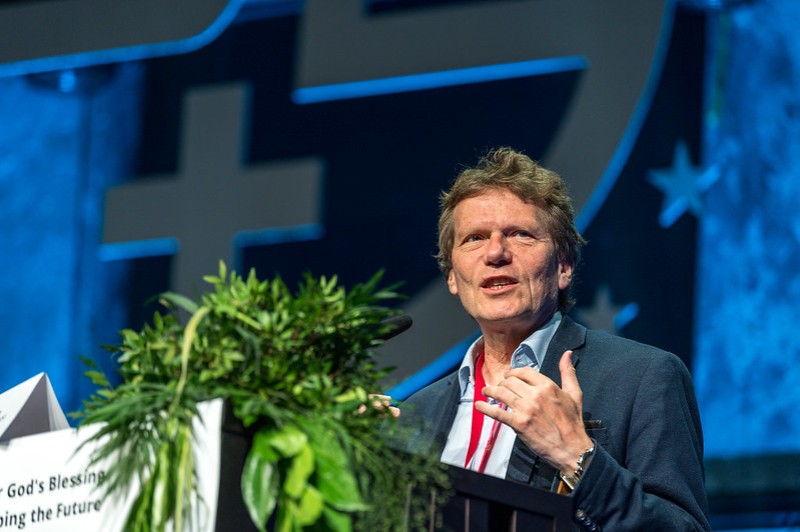
Albin Hillert/CEC
Press Release No: 15/23
16 June 2023
Tallinn
Prof. Dr Hartmut Rosa, German sociologist and keynote speaker at the 2023 CEC General Assembly, reflected on the role of churches in offering a different model to Europe’s desire for permanent growth and acceleration.
The CEC General Assembly is held from 14-20 June in Tallinn, Estonia, exploring the theme “Under God’s blessing – shaping the future.
The race to keep going
Rosa said that European society is at a point of “breakneck standstill,” in which life is focused on destructive growth to maintain the status quo. Giving the example of food industry, he shared how enzymes are put into ready-made meals to curtail the feelings of fullness and satisfaction. “The problem is that we simply have to keep growing in all industries, because otherwise jobs could not be preserved, even if objectively it no longer makes sense to grow,” Rosa said. “We live in a system that needs to grow to stay the same. Without that growth, the system breaks down.”
On the macro level, this system creates pollution and environmental problems; on the micro level, aggression and burnout. Rosa referred to the increase of mental health problems and suicide rates among young people, who are not able to take the stress of constant acceleration. He also linked the increasingly aggressive tone in politics and the rise of populism with the accelerated growth. “We have to run as fast as possible to keep what we have,” Rosa said. “With this model, we lose our future and our past.”
In response, Rosa proposed an alternative model of “resonance”. Referring to the biblical story of King Solomon, Rosa talked about a “listening heart” – a different conception of good life. “Resonance is when you get out of this acceleration mode because something touches you and you respond to it,” Rosa explained. “In this process we are transformed, we do not stay the same.”
Churches can be motors of a resonant Europe
Experiences of being called, touched, inspired and transformed are deeply theological. “As human beings we sometimes experience resonance, but religion and churches have ideas that can apply a framework to this sense of being connected,” Rosa said. Despite the “unavailability” of resonance – meaning that it cannot be planned, programmed or bought – churches offer physical spaces and practices that invite transformative experiences.
“The churches might be the motors for this resonant Europe,” Rosa concluded.
In response, Bishop Kari Mangrud Alsvåg from the Church of Norway encouraged churches to come alongside people who feel alienated and to be open to transformation by renouncing privileges and “maybe shrinking with joy and not aggression”.
Prof. Peter Kratochvil, Evangelical Church of Czech Brethren, emphasised a caveat from Rosa’s speech, namely that resonance cannot be programmed. “When the church already knows what is right and what is wrong, it becomes a resonance killer,” he quoted.
Read full text of Hartmut Rosa keynote speech
Photo gallery: https://www.flickr.com/photos/193971489@N08/
For more information or an interview, please contact:
Naveen Qayyum
Communication Officer
Conference of European Churches
Rue Joseph II, 174 B-1000 Brussels
Tel. +32 486 75 82 36
E-mail: naveen@cec-kek.be
Website: www.ceceurope.org
Facebook: www.facebook.com/ceceurope
Twitter: @ceceurope
YouTube: Conference of European Churches
Subscribe to CEC newsRead full text of Hartmut Rosa keynote speech